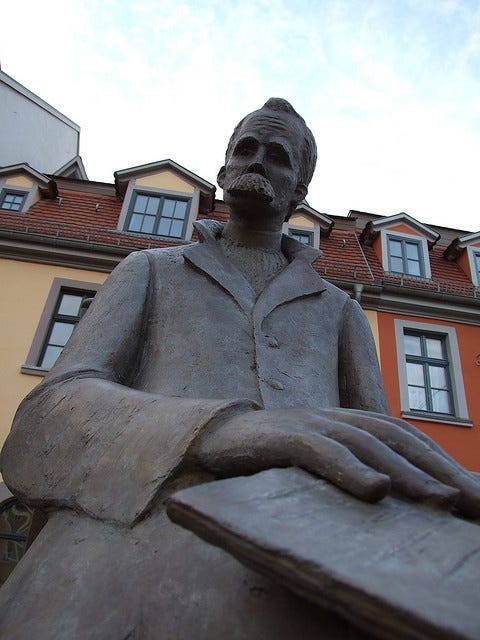Against Veneration
Ye venerate me; but what if your veneration should some day collapse? Take heed lest a statue crush you!
Ye say, ye believe in Zarathustra? But of what account is Zarathustra! Ye are my believers: but of what account are all believers!
–Friedrich Nietzsche, Thus Spoke Zarathustra
I have close friends who venerate Adam Smith, John Rawls, Friedrich Hayek, James Buchanan, John Maynard Keynes, Ayn Rand, John Stuart Mill, Ludwig von Mises, Paul Samuelson, Deirdre McCloskey, Elinor Ostrom, Hannah Arendt, Alexis de Tocqueville, David Hume, Murray Rothbard, Paul Krugman, or Thomas Jefferson.
“Venerate.” I choose the word with care. “Venerates X” means far more than “Admires X’s intellectual achievements.” It means, rather, than you (a) ascribe superlative and wide-ranging intellectual insight to X, and (b) energetically lobby to get X ample credit for their supposedly remarkable intellectual contributions. Thus, people who venerate Hayek don’t merely say, “Hayek made several fruitful points.” People who venerate Hayek maintain that Hayek’s work is packed with wisdom – and persistently advertise Hayek’s genius to the world.
This veneration of the Great Names mystifies me on two levels.
First, the standard idols just seem overrated. I’ve read everyone on the preceding list. When I was a teenager, I venerated a few of them myself. The more I learned, however, the less impressive even my favorites seemed. At this point in my life, not a one fills me with awe. Sure, they’ll all smart. Sure, they all made interesting observations. But once you set aside the halo effect, each and every one is, in his own way, a massive let-down.
How so? Some of the Great Names are comically dogmatic. Others make frequent glaring logical errors. Some love hyperbole. Others mask banalities in pompous academic prose. Some were great for their time. Others have been overrated from the get-go. Some simply lived before events and discoveries that seriously discredit their life’s work. Others manage to be equally oblivious despite an epistemically advantageous birthyear. Call me hard to please, but after a thorough read, I don’t see why any of the canonical intellectual idols deserve my veneration. Or anyone’s.
Second, lobbying on the idols’ behalf seems overrated as well. Suppose I’m wrong about one of the Great Names. Maybe Adam Smith really is the cat’s meow. I still have to ask: What’s the point of loudly and repeatedly declaring his awesomeness? I can understand why you would want to publicize Smith’s great arguments. Great arguments are what takes rational minds from error to truth. But habitually talking about the man himself seems like a colossal distraction.
I guess you could claim that today’s Adam Smith worship motivates the Smiths of the future: “O Promising Grad Student, if you become as great as Smith was, one day you too will have acolytes who devote their careers to singing your praises.” But it’s hard to believe that this has more than a tiny effect on current thinkers’ intellectual effort. Indeed, if history’s Great Names get too much praise, it’s easy to imagine current thinkers reducing their effort in abject frustration: “I’ll never match the glorious achievements of Adam Smith, so why bother?”
Many will assume that I’m trying to smash existing idols to clear the way for my personal favorites. There’s a kernel of truth here. When I hear “superlative and wide-ranging intellectual insight,” the people who come to my mind are none of the Great Names, but Phil Tetlock and Mike Huemer.
Yet in all candor, I don’t venerate them either. Venerate the living? That’s cultish! Kidding aside, I’m confident Tetlock and Huemer are glad not to be venerated. Truly great thinkers cherish meritocratic intellectual exchange, not Odes to Their Own Greatness.
But, you may ask, where’s the harm in veneration? Above all else, veneration taxes the search for truth. Once you idolize a thinker, it’s hard to calmly weigh his arguments. Perverse nepotism sets in: “Take heed lest a statue crush you!” Don’t believe me? Imagine if I randomly inserted some trite words into the works of whatever thinker you most venerate. Wouldn’t you be sorely tempted, by hook or by crook, to spin my forgery as yet another expression of your idol’s genius?
Finally, you could insist: Veneration may be objectively silly, but it brings meaning to many lives. A tempting plea, but what of the opportunity cost? We could take the brainpower we squander on mortal thinkers, and spend it instead on immortal arguments. Just picture it. We don’t have to settle for meaning alone. We can have truth as well.
The post appeared first on Econlib.



Actually, I could use a few Odes to my Greatness.
Somehow you managed to leave Milton Friedman off yourmlist. I suppose it's because he actually is worthy of veneration.